1. 利用Mininet仿真平台构建如下图所示的网络拓扑,配置主机h1和h2的IP地址(h1:10.0.0.1,h2:10.0.0.2),测试两台主机之间的网络连通性
- 网络拓扑如下:
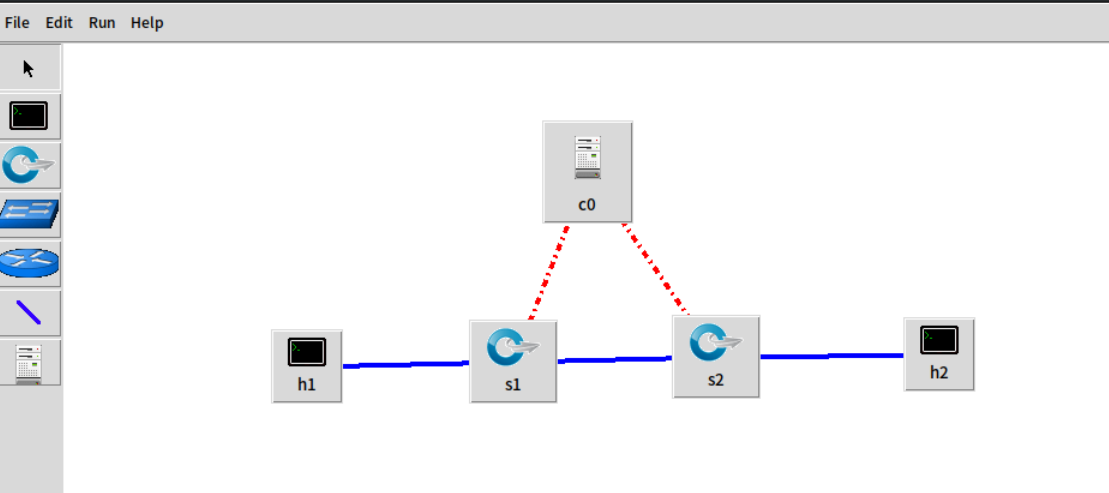
- 主机连通性测试:

2. 利用Wireshark工具,捕获拓扑中交换机与控制器之间的通信数据,对OpenFlow协议类型的各类报文(hello, features_request, features_reply, set_config, packet_in, packet_out等)进行分析,对照wireshark截图写出你的分析内容。
- HELLO报文
从控制器发往交换机的HELLO报文,说明控制器使用的协议版本为1.0

从交换机发往控制器的HELLO报文,说明交换机使用的协议版本为1.3

至此双方采用openflow1.0版本建立连接
Q1:Hello 消息是使用什么协议传输?TCP?UDP?
TCP,从上面的报文截图可以观察到传输层使用TCP协议
Q2:所有的网络协议在升级的时候都必须向前兼容更低版本的协议?why?
是。因为网络是一个庞大的系统,里面有很多机器是很早就部署好的,当协议升级后那些机器因为开销或各种原因没有办法立即更换。如果协议不能向下兼容,那这台机器就会失去作用,那它负责的网络就会无法访问,这是不能容忍的。 - Features Request报文
控制器向交换机请求特征信息

- Set Config报文

控制器配置交换机的属性- 第一个属性为 flags,用来指示交换机如何处理 IP 分片数据包。
- 第二个属性为 miss_send_len,用来指示当一个交换机无法处理的数据包到达时,将数据包发给控制器的最大字节数。
- Features Reply报文

报文详细内容如下:
No. Time Source Destination Protocol Length Info
20 0.136426006 127.0.0.1 127.0.0.1 OpenFlow 244 Type: OFPT_FEATURES_REPLY
Frame 20: 244 bytes on wire (1952 bits), 244 bytes captured (1952 bits) on interface 0
Linux cooked capture
Internet Protocol Version 4, Src: 127.0.0.1, Dst: 127.0.0.1
Transmission Control Protocol, Src Port: 57198, Dst Port: 6633, Seq: 9, Ack: 29, Len: 176
OpenFlow 1.0
.000 0001 = Version: 1.0 (0x01)
Type: OFPT_FEATURES_REPLY (6)
Length: 176
Transaction ID: 1882383166
Datapath unique ID: 0x0000000000000002
n_buffers: 0
n_tables: 254
Pad: 000000
capabilities: 0x000000c7
.... .... .... .... .... .... .... ...1 = Flow statistics: True
.... .... .... .... .... .... .... ..1. = Table statistics: True
.... .... .... .... .... .... .... .1.. = Port statistics: True
.... .... .... .... .... .... .... 0... = Group statistics: False
.... .... .... .... .... .... ..0. .... = Can reassemble IP fragments: False
.... .... .... .... .... .... .1.. .... = Queue statistics: True
.... .... .... .... .... ...0 .... .... = Switch will block looping ports: False
actions: 0x00000fff
.... .... .... .... .... .... .... ...1 = Output to switch port: True
.... .... .... .... .... .... .... ..1. = Set the 802.1q VLAN id: True
.... .... .... .... .... .... .... .1.. = Set the 802.1q priority: True
.... .... .... .... .... .... .... 1... = Strip the 802.1q header: True
.... .... .... .... .... .... ...1 .... = Ethernet source address: True
.... .... .... .... .... .... ..1. .... = Ethernet destination address: True
.... .... .... .... .... .... .1.. .... = IP source address: True
.... .... .... .... .... .... 1... .... = IP destination address: True
.... .... .... .... .... ...1 .... .... = IP ToS (DSCP field, 6 bits): True
.... .... .... .... .... ..1. .... .... = TCP/UDP source port: True
.... .... .... .... .... .1.. .... .... = TCP/UDP destination port: True
.... .... .... .... .... 1... .... .... = Output to queue: True
Port data 1
Port number: 65534
HW Address: f2:7d:e8:d6:b0:93 (f2:7d:e8:d6:b0:93)
Port Name: s2
Config flags: 0x00000001
.... .... .... .... .... .... .... ...1 = Port is administratively down: True
.... .... .... .... .... .... .... ..0. = Disable 802.1D spanning tree on port: False
.... .... .... .... .... .... .... .0.. = Drop all packets except 802.1D spanning tree packets: False
.... .... .... .... .... .... .... 0... = Drop received 802.1D STP packets: False
.... .... .... .... .... .... ...0 .... = Do not include this port when flooding: False
.... .... .... .... .... .... ..0. .... = Drop packets forwarded to port: False
.... .... .... .... .... .... .0.. .... = Do not send packet-in msgs for port: False
State flags: 0x00000001
.... .... .... .... .... .... .... ...1 = No physical link present: True
Current features: 0x00000000
.... .... .... .... .... .... .... ...0 = 10 Mb half-duplex rate support: False
.... .... .... .... .... .... .... ..0. = 10 Mb full-duplex rate support: False
.... .... .... .... .... .... .... .0.. = 100 Mb half-duplex rate support: False
.... .... .... .... .... .... .... 0... = 100 Mb full-duplex rate support: False
.... .... .... .... .... .... ...0 .... = 1 Gb half-duplex rate support: False
.... .... .... .... .... .... ..0. .... = 1 Gb full-duplex rate support: False
.... .... .... .... .... .... .0.. .... = 10 Gb full-duplex rate support: False
.... .... .... .... .... .... 0... .... = Copper medium: False
.... .... .... .... .... ...0 .... .... = Fiber medium: False
.... .... .... .... .... ..0. .... .... = Auto-negotiation: False
.... .... .... .... .... .0.. .... .... = Pause: False
.... .... .... .... .... 0... .... .... = Asymmetric pause: False
Advertised features: 0x00000000
Features supported: 0x00000000
Features advertised by peer: 0x00000000
Port data 2
Port number: 1
HW Address: 36:47:33:19:cf:87 (36:47:33:19:cf:87)
Port Name: s2-eth1
Config flags: 0x00000000
.... .... .... .... .... .... .... ...0 = Port is administratively down: False
.... .... .... .... .... .... .... ..0. = Disable 802.1D spanning tree on port: False
.... .... .... .... .... .... .... .0.. = Drop all packets except 802.1D spanning tree packets: False
.... .... .... .... .... .... .... 0... = Drop received 802.1D STP packets: False
.... .... .... .... .... .... ...0 .... = Do not include this port when flooding: False
.... .... .... .... .... .... ..0. .... = Drop packets forwarded to port: False
.... .... .... .... .... .... .0.. .... = Do not send packet-in msgs for port: False
State flags: 0x00000000
.... .... .... .... .... .... .... ...0 = No physical link present: False
Current features: 0x000000c0
.... .... .... .... .... .... .... ...0 = 10 Mb half-duplex rate support: False
.... .... .... .... .... .... .... ..0. = 10 Mb full-duplex rate support: False
.... .... .... .... .... .... .... .0.. = 100 Mb half-duplex rate support: False
.... .... .... .... .... .... .... 0... = 100 Mb full-duplex rate support: False
.... .... .... .... .... .... ...0 .... = 1 Gb half-duplex rate support: False
.... .... .... .... .... .... ..0. .... = 1 Gb full-duplex rate support: False
.... .... .... .... .... .... .1.. .... = 10 Gb full-duplex rate support: True
.... .... .... .... .... .... 1... .... = Copper medium: True
.... .... .... .... .... ...0 .... .... = Fiber medium: False
.... .... .... .... .... ..0. .... .... = Auto-negotiation: False
.... .... .... .... .... .0.. .... .... = Pause: False
.... .... .... .... .... 0... .... .... = Asymmetric pause: False
Advertised features: 0x00000000
Features supported: 0x00000000
Features advertised by peer: 0x00000000
Port data 3
Port number: 2
HW Address: 5e:78:e3:b1:ca:a6 (5e:78:e3:b1:ca:a6)
Port Name: s2-eth2
Config flags: 0x00000000
.... .... .... .... .... .... .... ...0 = Port is administratively down: False
.... .... .... .... .... .... .... ..0. = Disable 802.1D spanning tree on port: False
.... .... .... .... .... .... .... .0.. = Drop all packets except 802.1D spanning tree packets: False
.... .... .... .... .... .... .... 0... = Drop received 802.1D STP packets: False
.... .... .... .... .... .... ...0 .... = Do not include this port when flooding: False
.... .... .... .... .... .... ..0. .... = Drop packets forwarded to port: False
.... .... .... .... .... .... .0.. .... = Do not send packet-in msgs for port: False
State flags: 0x00000000
.... .... .... .... .... .... .... ...0 = No physical link present: False
Current features: 0x000000c0
.... .... .... .... .... .... .... ...0 = 10 Mb half-duplex rate support: False
.... .... .... .... .... .... .... ..0. = 10 Mb full-duplex rate support: False
.... .... .... .... .... .... .... .0.. = 100 Mb half-duplex rate support: False
.... .... .... .... .... .... .... 0... = 100 Mb full-duplex rate support: False
.... .... .... .... .... .... ...0 .... = 1 Gb half-duplex rate support: False
.... .... .... .... .... .... ..0. .... = 1 Gb full-duplex rate support: False
.... .... .... .... .... .... .1.. .... = 10 Gb full-duplex rate support: True
.... .... .... .... .... .... 1... .... = Copper medium: True
.... .... .... .... .... ...0 .... .... = Fiber medium: False
.... .... .... .... .... ..0. .... .... = Auto-negotiation: False
.... .... .... .... .... .0.. .... .... = Pause: False
.... .... .... .... .... 0... .... .... = Asymmetric pause: False
Advertised features: 0x00000000
Features supported: 0x00000000
Features advertised by peer: 0x00000000
**Q3:uint8_t pad[3] 这一字段的作用是什么?为了保证整个结构体长度是 64bits 的整数倍?**
是
- Packet_in报文
交换机收到报文时根据下发的流表进行转发行为。
在报文与流表项目匹配时,action指示发往控制器,则交换机会向控制器发送packet_in报文。
在没有控制器且在没有流表项目与报文匹配的情况下,交换机的默认行为是丢弃该报文。
在有控制器的情况下,交换机就会向控制器发送packet_in报文。
报文内容中值得注意的点是:
reason:no matching flow
以及一个封装在openflow协议中具有层次结构的ICMPv6报文
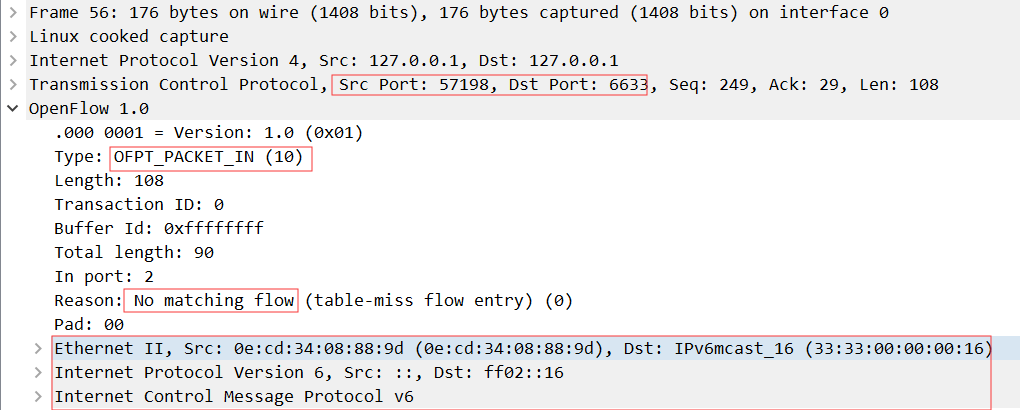
报文详细内容如下:
No. Time Source Destination Protocol Length Info
56 0.351175209 :: ff02::16 OpenFlow 176 Type: OFPT_PACKET_IN
Frame 56: 176 bytes on wire (1408 bits), 176 bytes captured (1408 bits) on interface 0
Linux cooked capture
Internet Protocol Version 4, Src: 127.0.0.1, Dst: 127.0.0.1
Transmission Control Protocol, Src Port: 57198, Dst Port: 6633, Seq: 249, Ack: 29, Len: 108
OpenFlow 1.0
.000 0001 = Version: 1.0 (0x01)
Type: OFPT_PACKET_IN (10)
Length: 108
Transaction ID: 0
Buffer Id: 0xffffffff
Total length: 90
In port: 2
Reason: No matching flow (table-miss flow entry) (0)
Pad: 00
Ethernet II, Src: 0e:cd:34:08:88:9d (0e:cd:34:08:88:9d), Dst: IPv6mcast_16 (33:33:00:00:00:16)
Destination: IPv6mcast_16 (33:33:00:00:00:16)
Address: IPv6mcast_16 (33:33:00:00:00:16)
.... ..1. .... .... .... .... = LG bit: Locally administered address (this is NOT the factory default)
.... ...1 .... .... .... .... = IG bit: Group address (multicast/broadcast)
Source: 0e:cd:34:08:88:9d (0e:cd:34:08:88:9d)
Address: 0e:cd:34:08:88:9d (0e:cd:34:08:88:9d)
.... ..1. .... .... .... .... = LG bit: Locally administered address (this is NOT the factory default)
.... ...0 .... .... .... .... = IG bit: Individual address (unicast)
Type: IPv6 (0x86dd)
Internet Protocol Version 6, Src: ::, Dst: ff02::16
0110 .... = Version: 6
.... 0000 0000 .... .... .... .... .... = Traffic Class: 0x00 (DSCP: CS0, ECN: Not-ECT)
.... 0000 00.. .... .... .... .... .... = Differentiated Services Codepoint: Default (0)
.... .... ..00 .... .... .... .... .... = Explicit Congestion Notification: Not ECN-Capable Transport (0)
.... .... .... 0000 0000 0000 0000 0000 = Flow Label: 0x00000
Payload Length: 36
Next Header: IPv6 Hop-by-Hop Option (0)
Hop Limit: 1
Source: ::
Destination: ff02::16
IPv6 Hop-by-Hop Option
Next Header: ICMPv6 (58)
Length: 0
[Length: 8 bytes]
Router Alert
Type: Router Alert (0x05)
00.. .... = Action: Skip and continue (0)
..0. .... = May Change: No
...0 0101 = Low-Order Bits: 0x05
Length: 2
Router Alert: MLD (0)
PadN
Type: PadN (0x01)
00.. .... = Action: Skip and continue (0)
..0. .... = May Change: No
...0 0001 = Low-Order Bits: 0x01
Length: 0
PadN: <none>
Internet Control Message Protocol v6
Type: Multicast Listener Report Message v2 (143)
Code: 0
Checksum: 0xe6e4 [correct]
[Checksum Status: Good]
Reserved: 0000
Number of Multicast Address Records: 1
Multicast Address Record Changed to exclude: ff02::1:ff08:889d
Record Type: Changed to exclude (4)
Aux Data Len: 0
Number of Sources: 0
Multicast Address: ff02::1:ff08:889d
- Packet_out报文
控制器回复报文给交换机做出指示,应当注意的字段为:
actions type:output to switch port
output port:65531

报文详细内容如下:
No. Time Source Destination Protocol Length Info
57 0.366529628 :: ff02::16 OpenFlow 182 Type: OFPT_PACKET_OUT
Frame 57: 182 bytes on wire (1456 bits), 182 bytes captured (1456 bits) on interface 0
Linux cooked capture
Internet Protocol Version 4, Src: 127.0.0.1, Dst: 127.0.0.1
Transmission Control Protocol, Src Port: 6633, Dst Port: 57198, Seq: 29, Ack: 357, Len: 114
OpenFlow 1.0
.000 0001 = Version: 1.0 (0x01)
Type: OFPT_PACKET_OUT (13)
Length: 114
Transaction ID: 0
Buffer Id: 0xffffffff
In port: 2
Actions length: 8
Actions type: Output to switch port (0)
Action length: 8
Output port: 65531
Max length: 0
Ethernet II, Src: 0e:cd:34:08:88:9d (0e:cd:34:08:88:9d), Dst: IPv6mcast_16 (33:33:00:00:00:16)
Destination: IPv6mcast_16 (33:33:00:00:00:16)
Address: IPv6mcast_16 (33:33:00:00:00:16)
.... ..1. .... .... .... .... = LG bit: Locally administered address (this is NOT the factory default)
.... ...1 .... .... .... .... = IG bit: Group address (multicast/broadcast)
Source: 0e:cd:34:08:88:9d (0e:cd:34:08:88:9d)
Address: 0e:cd:34:08:88:9d (0e:cd:34:08:88:9d)
.... ..1. .... .... .... .... = LG bit: Locally administered address (this is NOT the factory default)
.... ...0 .... .... .... .... = IG bit: Individual address (unicast)
Type: IPv6 (0x86dd)
Internet Protocol Version 6, Src: ::, Dst: ff02::16
0110 .... = Version: 6
.... 0000 0000 .... .... .... .... .... = Traffic Class: 0x00 (DSCP: CS0, ECN: Not-ECT)
.... 0000 00.. .... .... .... .... .... = Differentiated Services Codepoint: Default (0)
.... .... ..00 .... .... .... .... .... = Explicit Congestion Notification: Not ECN-Capable Transport (0)
.... .... .... 0000 0000 0000 0000 0000 = Flow Label: 0x00000
Payload Length: 36
Next Header: IPv6 Hop-by-Hop Option (0)
Hop Limit: 1
Source: ::
Destination: ff02::16
IPv6 Hop-by-Hop Option
Next Header: ICMPv6 (58)
Length: 0
[Length: 8 bytes]
Router Alert
Type: Router Alert (0x05)
00.. .... = Action: Skip and continue (0)
..0. .... = May Change: No
...0 0101 = Low-Order Bits: 0x05
Length: 2
Router Alert: MLD (0)
PadN
Type: PadN (0x01)
00.. .... = Action: Skip and continue (0)
..0. .... = May Change: No
...0 0001 = Low-Order Bits: 0x01
Length: 0
PadN: <none>
Internet Control Message Protocol v6
Type: Multicast Listener Report Message v2 (143)
Code: 0
Checksum: 0xe6e4 [correct]
[Checksum Status: Good]
Reserved: 0000
Number of Multicast Address Records: 1
Multicast Address Record Changed to exclude: ff02::1:ff08:889d
Record Type: Changed to exclude (4)
Aux Data Len: 0
Number of Sources: 0
Multicast Address: ff02::1:ff08:889d
3.总结
以上就是OPENFLOW报文交互时的6种常见报文,常见的交互流程如图所示:
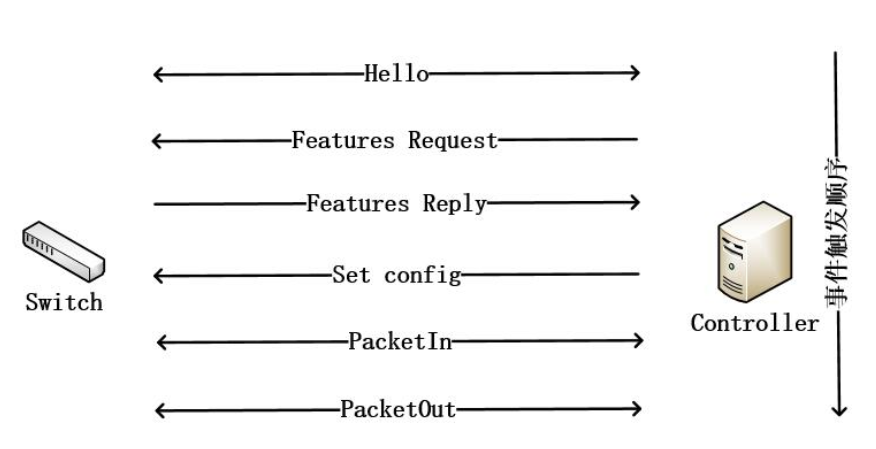
而交换机的转发行为如下所示:
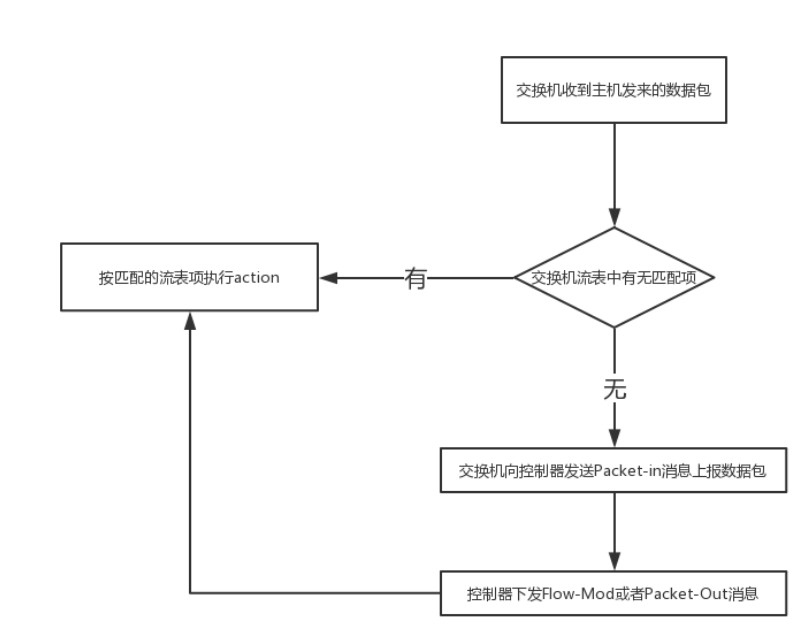
flow_mod报文如下:
flow_mod报文由控制器下发流表指导转发行为
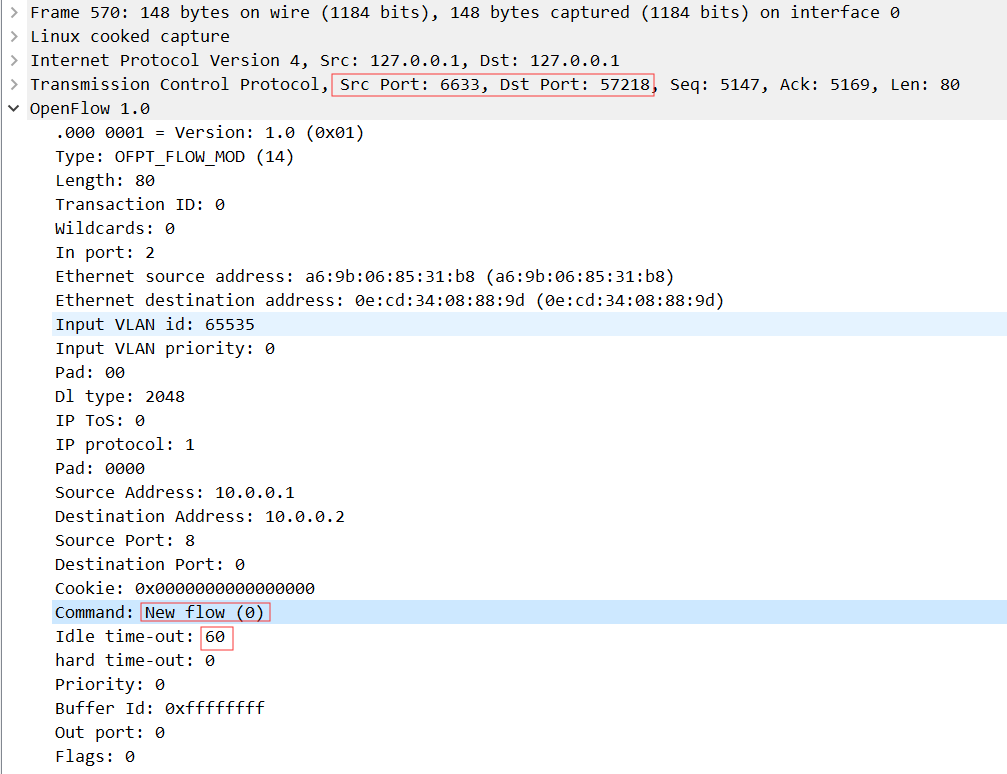
h1 ping h2的交互过程:
可以看出是由控制器指导ICMP报文的转发,在这里面有一些提示no response found,这个是wireshark抓包后自己添加的分析内容,其实观察的话会发现request报文和response报文一直是一对一的。

把控制器的controller type从openflow reference改为OVS controller则openflow协议版本由1.0变为1.3